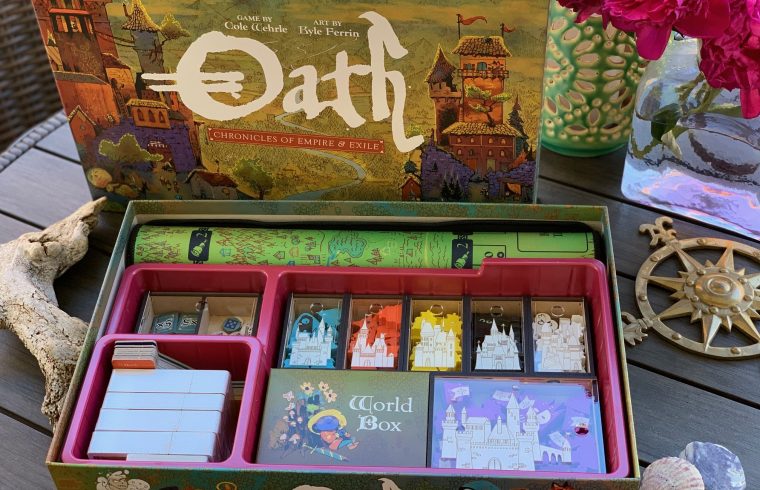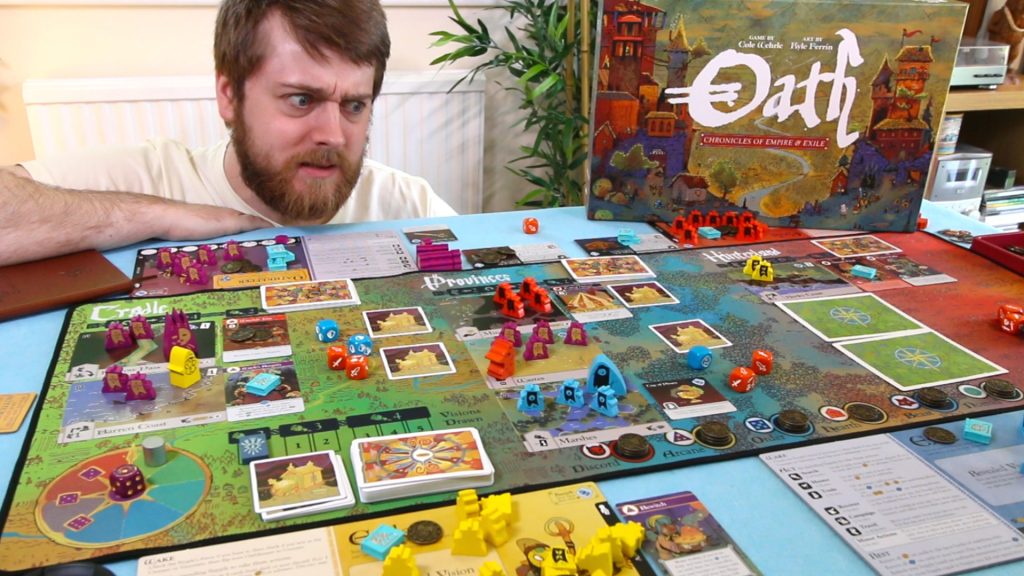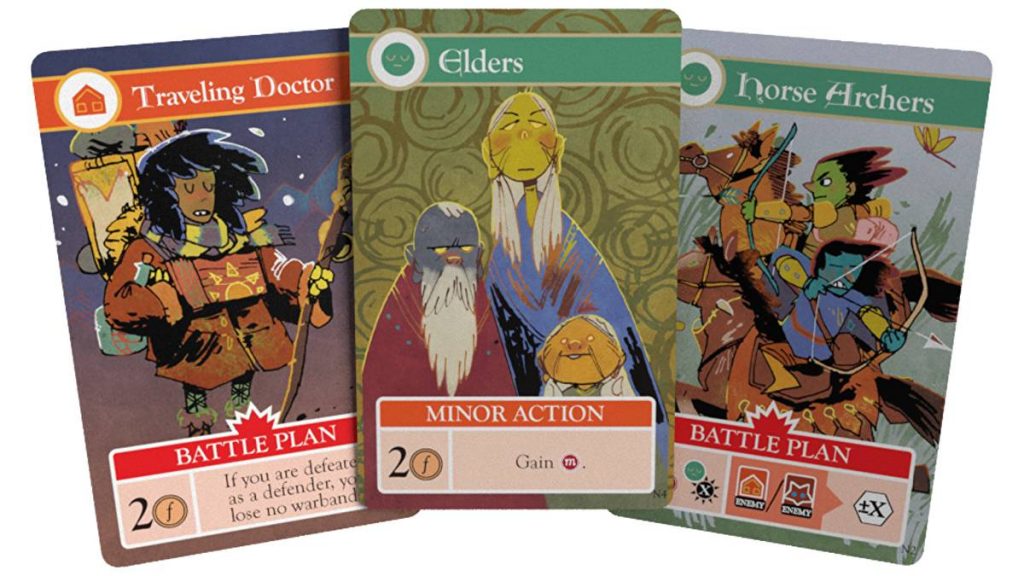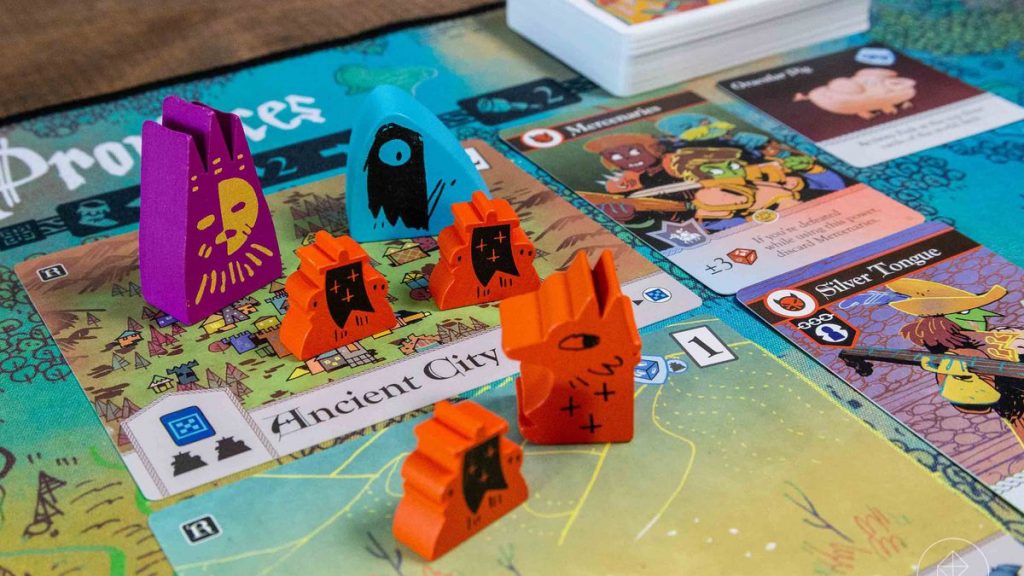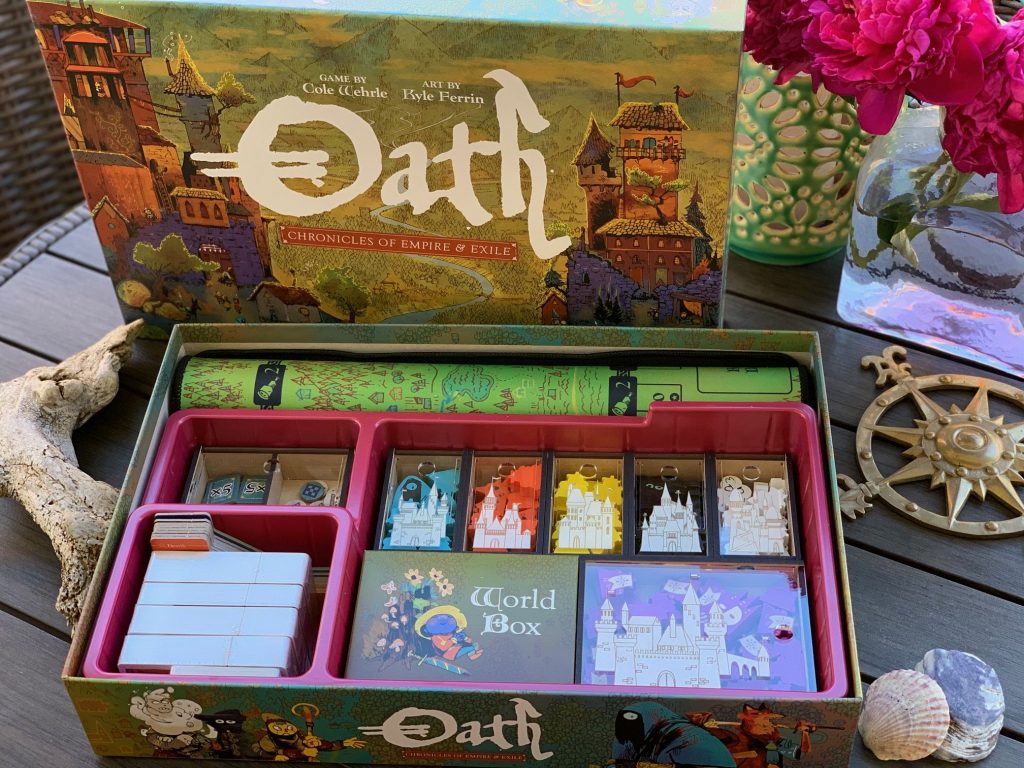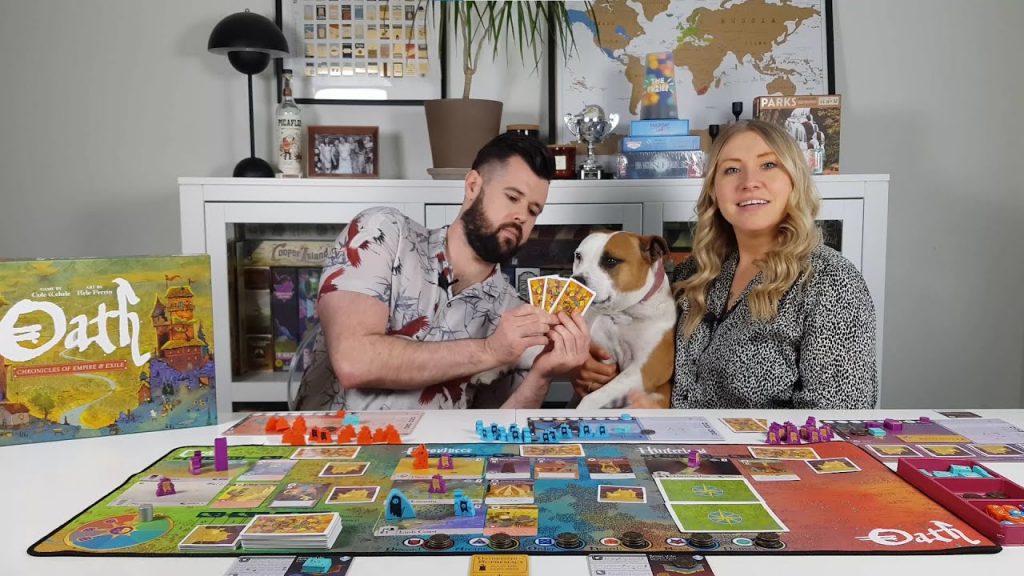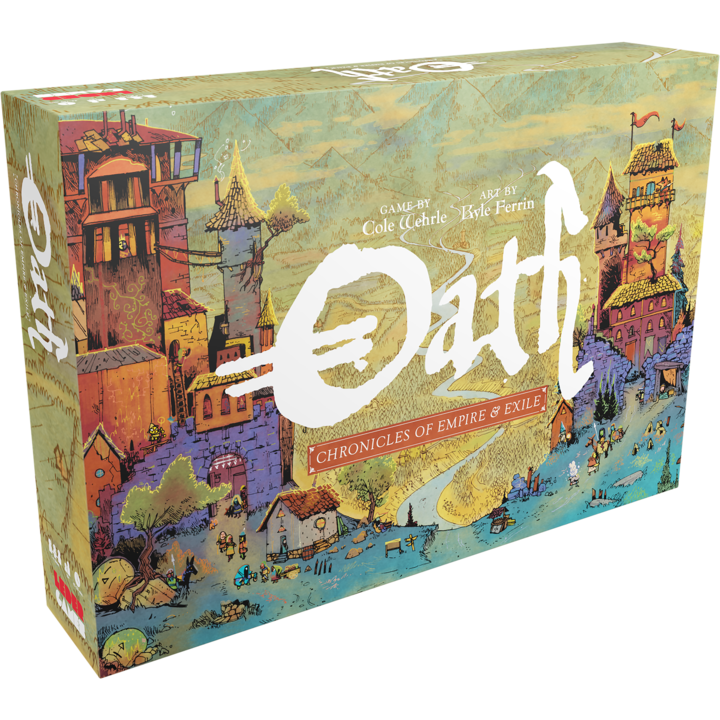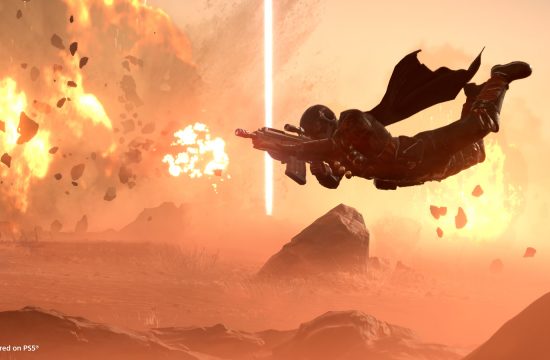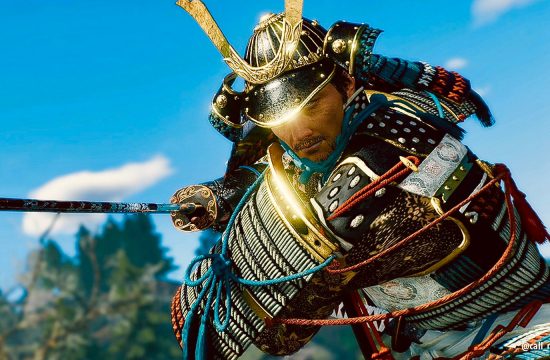When we speak of games, genres and playstyles become an easy shorthand to relay information; if you enjoy this game, you’ll probably like this other game that is like it. That can be a powerful way to communicate recommendations, but it can also be a dangerous crutch when encountering something new. That’s the case with Oath: Chronicles of Empire and Exile. As a board game that defies easy classification or comparison, it may be hard to decide if it’s a good fit for your gaming group. But for those hungry for novelty, innovation, and strategic gameplay that reveals new layers after each playthrough, Oath is a standout success.
Leder games has developed a reputation for asymmetric gameplay designs, and that dynamic is clear as you pull back the lid on Oath to start your first game. In this one- to six-player game, players adopt the roles of competing individuals attempting to control a vast fantasy empire. One player takes on the part of the Chancellor, the beset ruler of the land, desperately trying to cling to power against a tide of military and political challenges to his rule. Those challenges primarily come from the other players around the table, who begin the game as Exiles, each of whom may or may not become a Citizen along the way. While each player may pursue different ends and victory conditions, you’re ultimately seeking to grab control so that you may lead the empire in subsequent eras.

Your first few games of Oath can take a long time, but once all players know the rules, expect a playtime of under two hours
In a fascinating twist, the outcome of one game changes the start-up conditions of the next session. The center of power on the board moves to the victor. New cards enter play, and old ones leave, in part representing the individuals and circumstances that have gained or fallen out of favor with the new regime. Even future victory conditions shift. It’s not a legacy game in the strictest sense, as there aren’t proper carryover story elements, surprise twists, additional components, or the like. Instead, a copy of the game begins to develop as an individualized chronicle of this particular empire. Each session is a generation of conflict, and the next session continues the history, sometimes repeating the mistakes of the past and sometimes branching in new directions.
With that generational depth as its guiding principle, Oath becomes a game chiefly concerned with the nature of power. It examines the holding of power, the wresting away of it, and how it breeds conflict from one generation to the next. Those concepts are baked into the mechanics of play. The Chancellor seeks to maintain a hold over land and resources but must often recruit allies to have a chance at success. Inviting an Exile to become a Citizen might be the edge you need to cling to control, but it opens up the opportunity for the newly risen Citizen to win by maneuvering to become your successor. As an Exile, you might choose to remain independent, gathering resources and secrets and chasing new win conditions as they arise, presented as Vision cards about shaping the empire’s future. Perhaps you harbor the Vision of Faith by learning and holding the Darkest Secret. Or you might pursue the Vision of Rebellion by garnering the People’s Favor and holding it until the endgame triggers.

An asymmetric structure places one player in charge of the empire, while the other players aim to gain control
If you’re noting a preponderance of heady capitalized proper nouns in the descriptions above, it’s not accidental. Oath is a game of emergent narrative but not of specific flavor-text-driven storytelling. The idea is that you’re exploring across the game map, visiting different sites and meeting – and sometimes clashing – with the denizens of the empire. Still, much of the nitty-gritty of what happens as you acquire components and cards is left to your imagination. What exactly are the deep secrets that you’re gleaning as little tokens? What is the nature of the conspiracy that brings down the Chancellor? You’re welcome to craft these tales, talk and laugh about them as you play, but it circles back to core concepts about power, like conquest, the favor of the people, and the nature of alliances.
Players take actions each turn to play out that loose story framework, mustering troops across the board, trading favors, and enacting military campaigns against enemies. Each action diminishes your Supply, a nebulously defined resource determining how much you can do on a turn – pared by the size of the army you’re currently fielding. While there is plenty of terminology, nuance, and variety to what happens, the core loop of play isn’t all that complicated. But a simple game this is not.

The board is split up into three distinct regions, with different cards appearing in each spot for subsequent game playthroughs
Some games I pull out onto the table because I want a quick and easy game to grasp, accessible, and immediately enjoyable to a wide array of players. Oath is not that board game . Oath is a challenging and potentially overwhelming game because of the various win conditions, the asymmetric nature of player power at each game’s start, and the many varied paths you might take to try and win (which change from session to session). That sophistication and complexity should be enough to warn away at least some inexperienced players, but it’s also the chief reason to fall in love with Oath. Everything is about enacting a clear strategy and maintaining enough flexibility to shift directions as circumstances change. It’s about observing your opponents’ actions, hoping that you can outmaneuver them before they reach their often-hidden goals.
It’s the kind of game that gives a tremendous advantage to the experienced player. So, even though you can shift the playgroup from one session to the next, the best way to appreciate Oath is with a relatively consistent group, each of whom can enjoy the implied dynamic of a new generation of conflict in this strange fantasy land.
To battle the frustration that might come from those first early sessions, Oath relies on its high production values and beautiful art to enhance the experience. Most players are unlikely to grasp the ins and outs of the strategic options in their first run at the game. Only later does Oath open up as a coherent system of interlocking goals and actions – and it’s in that moment that it shines. In the meantime, the beauty of the game should be more than enough to keep your attention. The board is a lovely cloth mat that rolls out onto the table, filled with autumnal colors and tiny details. Hundreds of unique art pieces bring the cards to life, which look like they are halfway between cartoon art and the sort of thing you’d see depicted in an ancient medieval illuminated manuscript. Character pawns and custom dice add flair and brightness to the table layout. It’s a beautiful game with just enough whimsy not to take itself too seriously.

Players who begin as Exiles can become Citizens, changing the conditions they pursue to win the game
Even with great production values, Oath can be challenging to digest, and the game’s creators at Leder seem to recognize that truth. Publishers have been prioritizing onboarding for new players in recent years, as it remains one of the biggest obstacles to getting into the tabletop hobby. I’ve been fascinated by the various methods that different game makers try. In this case, Leder games uses a dedicated Playbook as a tutorial for the game. Within, the game’s core concepts get laid out, and the specific actions that might begin a four-player game are explained, structured to communicate several of the different strategies and particular moves a player might make to get going. It’s a solid tutorial, but you can still expect to encounter things you don’t understand, so be aware that eventually, you will need to dive into the more specific rules reference booklet to grasp what’s happening.
I always appreciate a game that offers a solo variant, letting a game owner familiarize themselves with the flow of play ahead of sharing it with friends or just having a way to play when everyone else bails on game night. In the case of Oath, the game establishes a non-human opponent, called the Clockwork Prince, against whom you can vie for victory. It’s a fascinating structure, as it uses a flow chart to present a sort of artificial intelligence for your enemy, injecting more life into the game’s automated actions than is often the case. But the flow chart can also be a bit convoluted to follow. Moreover, the use of the Clockwork Prince disregards one of the things I like best about the game – the sense of a shared history to the empire that the whole player group is aware of and understands. In short, it’s a helpful addition but not my recommended path to best enjoy the game.

Oath features top-notch components, art, and overall production values
Oath defies classification. While borrowing elements of area control, alliances and negotiation, player betrayal, legacy gameplay, army combat, and action point management, it’s not centrally focused on any of those things. Instead, Oath challenges players to think in abstract terms about the nature of power and provides a framework of rules and objectives to play out the resulting conflicts. Players are likely to miss a lot the first few times they play, and that’s just fine. Not unlike the beginnings of any imperial dynasty throughout history, things grow more complicated with time as you return to the game again and again. If you’re willing to invest the time and multiple sessions required to grasp Oath’s potential, it transforms into one of the most intriguing tabletop releases in some time.
Not every game is as demanding of its players’ strategic thinking as Oath. If you’d like to peruse a range of other fantastic board and role-playing games that you might bring to your table, don’t hesitate to scroll through the backlog of Top of the Table articles, including last year’s selections for the Best Board Games and Best RPG releases of 2020. I’m also always happy to offer personalized recommendations; drop me a line and let me know what you’re looking for, and I’ll be glad to try and point you in a good direction.


